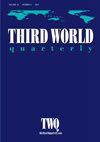Morocco’s northern border region: gender, labour and mobility
IF 1.8
2区 经济学
Q2 DEVELOPMENT STUDIES
引用次数: 0
Abstract
Abstract This paper presents the results of two recent studies on gender, labour and mobility on the borders between Morocco and Spain. Industrial relocation and the feminised labour market was the first focus of our attention. Subsequently, we integrated research on cross-border labour markets, such as the small-scale commercial activity carried out by women. The objective of these studies is to understand the impacts of globalisation processes, such as industrial relocation and border dynamics, on the daily lives of women. Therefore, we consider theoretical approaches to female participation in emerging economic circuits in developing countries as a macro-vision that enables contextualisation at a micro-social level. At the micro level, our analysis draws from the notion of lived precariousness as a perspective that allows us to examine the testimonies and the meaning they give to their experience. The results not only indicate that the complexity of border life and its precariousness represent a challenge for women – who develop different ways of dealing with structural and cultural limits as they strive for more substantial autonomy and empowerment – but also provide a glimpse of a broader trend in female economic participation in these circuits that appears to reproduce gender inequalities and pose new obstacles.摩洛哥北部边境地区:性别、劳动力和流动性
本文章由计算机程序翻译,如有差异,请以英文原文为准。
求助全文
约1分钟内获得全文
求助全文
来源期刊

Third World Quarterly
DEVELOPMENT STUDIES-
CiteScore
4.10
自引率
15.00%
发文量
137
期刊介绍:
Third World Quarterly ( TWQ ) is the leading journal of scholarship and policy in the field of international studies. For almost four decades it has set the agenda of the global debate on development discourses. As the most influential academic journal covering the emerging worlds, TWQ is at the forefront of analysis and commentary on fundamental issues of global concern. TWQ examines all the issues that affect the many Third Worlds and is not averse to publishing provocative and exploratory articles, especially if they have the merit of opening up emerging areas of research that have not been given sufficient attention. TWQ is a peer-reviewed journal that looks beyond strict "development studies", providing an alternative and over-arching reflective analysis of micro-economic and grassroot efforts of development practitioners and planners. It furnishes expert insight into crucial issues before they impinge upon global media attention. TWQ acts as an almanac linking the academic terrains of the various contemporary area studies - African, Asian, Latin American and Middle Eastern - in an interdisciplinary manner with the publication of informative, innovative and investigative articles. Contributions are rigorously assessed by regional experts.
 求助内容:
求助内容: 应助结果提醒方式:
应助结果提醒方式:


